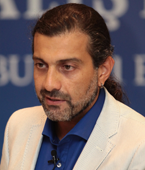|
Summer 2014 Vol.13 No.2

|
|
|
D. Nigâr Göksel
“As has become a TPQ tradition over the years, our Summer issue focuses on Turkey’s economic trajectory and dimensions related to it including education, energy geopolitics, environmental concerns, and governance issues.”
“In our multifaceted look at Turkey’s economic growth, this issue’s authors evaluate the sustainability of the upward-moving trends of the past decade, and share insights with regard to the choices ahead for Ankara’s policymakers.”

|

|
|
|
Tony Hayward
“Reflecting on my 30 years in the industry and the 150-odd years our industry has been in existence, there are three recurring themes that have shaped our industry and I suspect always will. These are geopolitics, oil and gas prices, and technology – and I put them deliberately in that order.”
“In total, political events in the Middle East have reduced gross oil production across the region to around three million barrels a day. It will take some fundamental change to recover this production and, as the rise of the Islamic State of Iraq and Syria (ISIS) threatens to make things worse before they get better, it is difficult to see this happening in the near future.”
“The challenge for the industry is continuing to improve on the technology we use today, or at least finding a way of applying it better and more commercially than has been achieved to date.”

|

|
|
|
Metin Feyzioğlu
“Turkey has arrived at a point characterized by progressively deepening political and social polarization and inter-institutional conflict, a situation brought about through the impact of illegal intervention in the law and politics.”
“The lower the confidence is in the institution of law, rule of law, and independence of the judiciary in a country, the more risky that country is likely to be considered by investors.”
“Restructuring the High Council of Judges and Prosecutors (HCJP) and the Constitutional Court is a must, and a new regulation that will release the judiciary from political pressure is required.”

|

|
|
|
Ömer Aras
“The main challenge for Turkey is to transition its growth from a catching up process to value-added, efficient production-oriented growth. In other words, Turkey should promote innovation and thereby productivity. This can only be achieved by effective, high quality education.”
“Turkey has the most valuable natural resource a country can have: a young population. If we furnish our youth with quality education, we will achieve our government’s targets for 2023 and beyond. We must radically change, and ideally revolutionize, the education system.”
“The only principle we should follow is to have an education system that finds the creativity in each individual. This can only be achieved with the kind of education that will cultivate each and every person’s individual qualities. The concept of ‘customization’ must be adopted in our education system.”

|

|
|
|
Korhan Kurdoğlu
“The lesson to be taken from this profound period of transformation in the workplace is that new realities need to be served by new and improved organizations; the consequences can be devastating otherwise.”
“Today, positions should not be created by bundling functions, as this is contrary to the uniqueness of people. Standard job specifications demotivate and disengage people.”
“When people have faith in their organization’s purpose and their fellow colleagues, they will be motivated to work for more than just material gains.”

|

|
|
|
James F. Jeffrey
“President Obama is leading an ideological campaign to remove military action effectively from the American foreign policy toolkit. He suggested as much in debating Hillary Clinton during the Democratic Party Presidential primary race in early 2008, stating that he not only wanted to end wars, but the thinking that led to them.”
“If Obama were to explain to the American people the logic for red lines and underline his willingness to act when they are crossed, he could ‘reset’ much of our security agenda.”

|

|
|
|
A. Turgay Adıyaman
“Branding is overused, misused, and makes many people think of superficial marketing tricks to attract more investors and more tourists. Do you want to turn your location into a destination? Try branding it. Go for a logo and airy slogan, then big noise on advertising, Public Relations, inside and outside. Does it really help? It simply does not.”
“You simply cannot change the image of a country solely by communication. If you do that, it might mean something along the lines of, ‘Your thinking is not right. Please change your mind about this country.’ Obviously no one would do that.”

|

|
|
|
Michael Hoffmann
“Everybody will benefit if gas comes from multiple sources. I do not see any rivalry between various gas suppliers; we just have to see which supply sources realistically can materialize first. There is a lot of potential for Northern Iraqi, Turkmen and East-Med gas, from Cyprus or Israel – however, the resolution of political issues is fundamental.”
“I think the challenge for Turkey is actually more about whether they can trade that gas – buy it and sell it around the region. Turkey is growing, so it will need gas for domestic consumption. It will need to determine how much Turkey wants to keep and how much it wants to trade and export.”

|

|
|
|
Nicholas Borroz
“Deepening ties with Kurdistan makes sense for Turkey from an energy security perspective because Kurdistan has ample supplies of oil and gas and is more secure than the rest of Iraq. Turkey’s strategy to diversify its energy supply, however, will depend on the Kurds’ ability to maintain stability in the face of the threat of the Islamic State.”
“Turkey holds all the leverage over Kurdistan; whereas it can import oil from global markets, Kurdistan’s economic survival relies upon accessing consumers via Turkish territory.”

|

|
|
|
Aslı Ay
“In the long term, Turkey being left out of the Transatlantic Trade and Investment Partnership (TTIP) will have dire geostrategic consequences, akin to being left out of efforts to restructure the Western liberal economic order.”
“Turkey has powerful arguments as to why it should be included in TTIP, and it needs to deliver these arguments as part of a sustained, well thought-out, and funded campaign to shape public opinion in the US. The central message should be that the inclusion of Turkey in TTIP would visibly contribute to TTIP’s economic, strategic, and political goals.”

|

|
|
|
Mikael Eriksson
“It is misleading to suggest that the sanctions measure the West is enforcing is simply a weak and symbolic measure pursued for the sake of responding short of war. On the contrary, it seeks to change behavior within a larger grand strategy. In fact, so far sanctions have posed a forceful and potent measure.”

|

|
|
|
Önder Algedik
“We have to ask ourselves ‘Why is Turkey becoming more carbon intensive while the technology provides more service with less energy?’ Turkey’s dismal climate scoreboard is best understood by the Turkish economy’s heavy dependence on industries with high carbon emissions.”

|

|
|
|
Cem Çağatay Orak & Murat Erbilen
“We strongly believe that the establishment of the Istanbul Arbitration Center is a positive and striking step taken by the government. Yet it is fair to say that the language of the Draft Law needs to be improved so that the Center will be an independent, effective, reliable, and competitive one among other international arbitration centers.”

|

|
|
|
Ahu Öztürkmen Yıldırmaz
“While the established economies of the US and the EU have seen a lag in available jobs in the wake of the recession, Turkey’s labor force has steadily increased for both men and women in all age groups.”

|

|
|
|
Heng Quan & Hairong Luo
“The remarkable economic growth in China is not achieved without cost – the GINI coefficient of resident’s income, recently published by National Bureau of Statistics of China, is very close to 0.5, which many scholars believe to be the minimum level before widespread social unrest.”

|

|
The Premium Corporate Sponsor of this Issue:


|
Thanks to our Partners



|
|
|










































